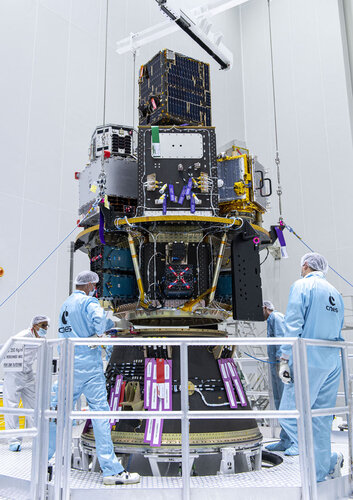The ESAIL microsatellite for tracking ships worldwide – developed under an ESA Partnership Project – has completed its accommodation on Vega’s new dispenser for small satellites and is ready for launch.
The Vega launch campaign at Europe’s spaceport in Kourou, French Guiana, resumed three weeks ago, following an interruption caused by the coronavirus pandemic.
ESAIL is due to be delivered into a Sun-synchronous orbit at an altitude of more than 500 km on Arianespace’s first Vega Small Spacecraft Mission Service (SSMS) rideshare flight. The launch will deliver seven microsatellites and 46 cubesats into orbit, using a new satellite dispenser that spreads the cost of launch between many customers.
The ESAIL high-performance microsatellite was built by LuxSpace under an ESA Partnership Project with the Canadian operator exactEarth. The project was supported by the Luxembourg Space Agency and other ESA member states.
ESA’s Partnership Projects aim to develop sustainable end-to-end systems, right up to in-orbit validation.
ESAIL will track ships worldwide by detecting messages that ships radio-broadcast with their automatic identification systems (AIS).
As part of exactEarth’s satellite-based AIS constellation, ESAIL will provide data also to the European Maritime Safety Agency for the next generation of global maritime traffic services.
ESAIL enables fisheries monitoring, fleet management, environmental protection and security monitoring for maritime and government authorities and industry – making the seas safer.
Vega’s Small Spacecraft Mission Service (SSMS) dispenser provides launch opportunities for multiple light satellites with an overall mass ranging from 0.2 kg CubeSats up to 400 kg minisatellites.
The SSMS has a lightweight modular design comprising a lower and upper part each with attachments that can be used to accommodate a range of configurations of satellites depending on requirements.
Vega is a 30 m-high, four-stage launch vehicle operating out of Europe’s Spaceport in French Guiana. It is designed to lift between 300 kg and 1.5 tonnes of payload depending on the orbit and altitude.
ESA’s upcoming Vega-C, a more powerful version of Vega, will offer an extra 700 kg of capacity and enlarged volume within a wider launcher fairing at a similar cost to Vega – allowing even more passengers per individual rideshare launch at significant lower cost per kilogram.
– Advertisement –
